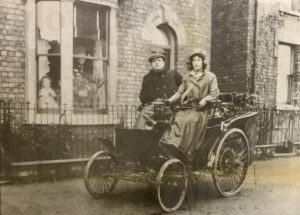The 20th Century is the age of motoring and in south Lincolnshire the internal combustion engine has been a major factor in transforming the lives of ordinary people.
From February 1901, when Spalding‘s first car pottered into the town, driven by its proud owner, local builder’s wife Mrs Emily Kate Parkinson, without benefit of driving lessons, test or licence – to virtually universal car ownership a 100 years on. Then large numbers of villagers had never been as far as Spalding or Bourne and the wider world was a mystery to them,
Now very few people, young or old. haven’t sampled the delights of London and abroad, day trips and shopping trips taking in a wider and wider radius of home.
At least Mrs Parkinson didn’t need to worrv about traffic law when she picked up her new dark blue Benz with scarlet trimmings from Nottingham with the man who’d sold it to her, J T Andrews. of Spalding’s Mill Lane cycle and engineering works, and drove it home.
It wasn’t until two years later that the Motor Car Act went through Parliament and when it did she obtained registration and a licence.
She was given the index number DO 10 and the registration showed that her three and a halt horsepower vehicle, described as an “International B Dog Cart”, seated four people.
She may well have been apprehensive about handling the revolutionary machine but concerns about accidents and traffic congestion lay in the future though, in the case of accidents, these weren’t too far ahead.
A skim through the pages of the Spalding Free Press of 1906 reveals that already cars were causing problems and questions were being asked about road safety.
A number of people became too nervous to drive on the highway and residents living by the high roads were subjected to frequent scares.
Parents were afraid to let their children go to school or play by the wayside.
A Free Press journalist of the time thundered that an example should be made of motorists responsible for a rising catalogue of accidents in which horse-drawn vehicles generally came off worse than the cars involved.
He claimed that most motorists were wealthy and said even a heavy fine for motoring offences was no penalty.
His article pointed out that the highways were for everyone’s benefit, not just for the better off.
In 1906 the paper reported:
Source: Lincolnshire Free Press – 30th Dec 1999
